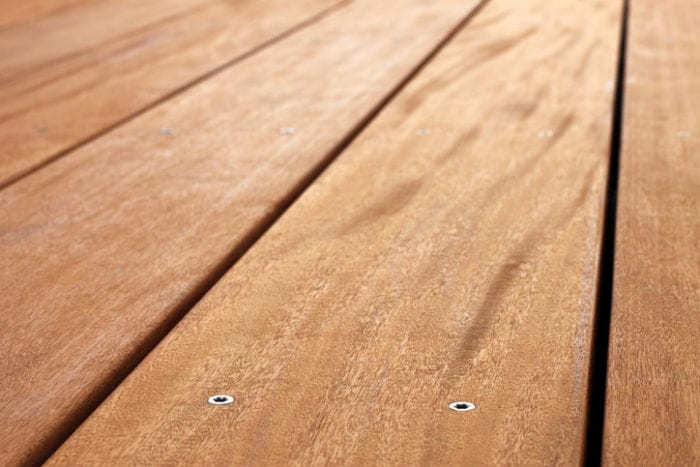All About Garapa Hardwood

Are you thinking about building a new deck or fence? You know you want the incredible durability and beauty of a tropical hardwood but there are many options. If you’re debating the merits of the different hardwoods out there, we urge you to consider garapa. It’s an excellent material to use for a variety of projects and it’s also a budget-friendly alternative to ipe.
Garapa hardwood facts
Garapa, also known as Brazilian ash, is from a tree that grows in Brazil, Venezuela, and other South American countries. The garapa tree can grow up to 100 feet tall with a diameter of five feet.
Garapa wood has a beautiful color that varies from light yellow to deep golden brown. Homeowners love the look of this popular wood, which can be used for siding, decking, fences, furniture, and more. With its fine-to-medium texture and straight grain, garapa is considered fairly easy to work with. Garapa is also durable and resistant to pests and fungi.
How tough is garapa?
Garapa is a durable hardwood with a 30+ year lifespan that is suitable for many applications. It has a Janka Hardness rating of 1,650 pounds, which is softer than other tropical hardwoods like ipe and cumaru but significantly harder than redwood or cedar. Garapa is also dense and resistant to:
- Decay and rot
- Extreme weather
- Splinters
- Insects
- Fire (garapa usually receives an A or B rating when looking at flame spread)
Garapa maintenance
Like all the hardwoods we sell, untreated garapa will turn a pleasing light silver as it ages. If you appreciate this aging process, then no coating or sealers need to be used. If you prefer to maintain its honey tone, simply apply a UV inhibitor once a year.
How does garapa compare to ipe?
While ipe hardwood is still the top choice for those seeking the ultimate in durability, garapa has many benefits. Garapa is lighter in weight than ipe so it’s easier to manage the wood prior to construction. Garapa is also easier to work with than ipe since it’s not as hard.
Plus, garapa is considerably less expensive than ipe. Here at Hardwood Decking Supply, our 1×6 lengths of garapa are currently $1.99 per linear foot (compared to $3.39 for ipe) and 5/4 x 6 lengths are $2.59 per linear foot (compared to $4.49 for ipe).
Good news! All tropical hardwoods will provide an excellent return on your investment (ROI) due to their extraordinarily long life. While pressure treated boards start to fade and break down between five to eight years and composite boards last about ten years, tropical hardwood boards can last from 30-50 years! Think about how many pressure-treated, composite, or cedar boards would need to be replaced during that span of time. When you consider the lifetime costs of the boards, it’s clear that hardwoods are cost effective in the long-term.
Shop our tropical hardwood options
Whether you choose garapa or ipe, you’ll be assured of a beautiful end-product that will last for decades. If you’re uncertain about the best hardwood to use for your project, call our experts today at 866-452-2573. We have the experience and the knowledge to guide you through the purchasing process to ensure that you receive the best wood for the job.


Lowest Prices For Tropical Wood Decking Available
At Hardwood Decking Supply, homeowners and contractors receive the highest quality grade-A Ipe, Batu (Mahogany), Cumaru, Tigerwood, and Garapa wood at incredibly low prices and excellent customer service from our decking experts.
